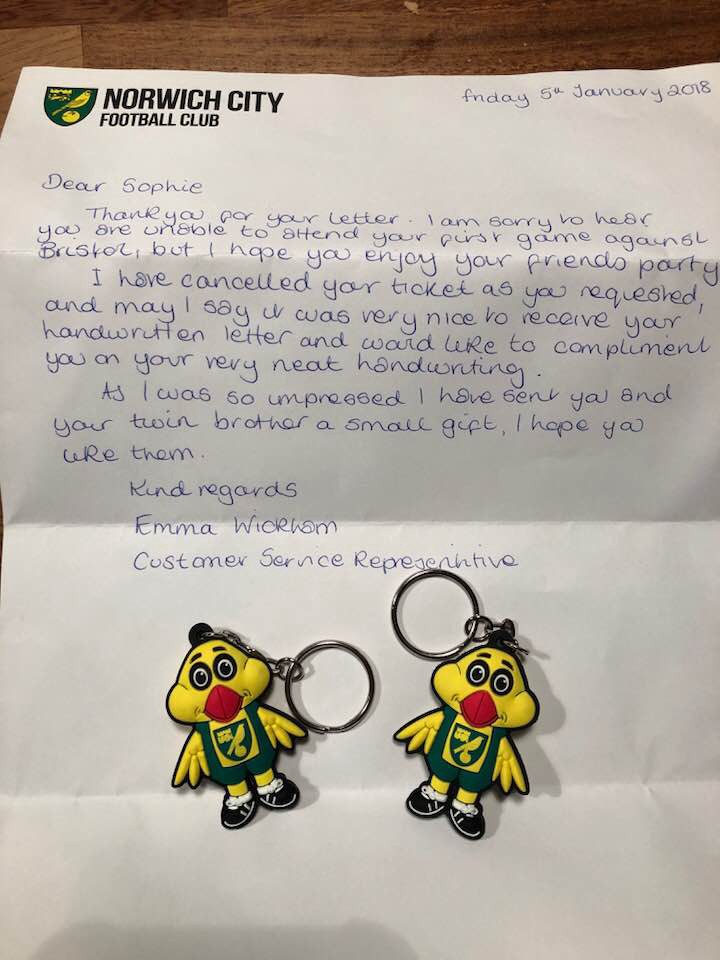Some time ago, I came across an article about a response a seven-year-old had received from Norwich City Football Club. The young fan had written a letter to apologise for not being able to attend her first match and to ask for a refund. A member of the Customer Service team, Emma, had handwritten a reply and included a couple of keyrings. The feedback on Twitter focused on how lovely this was of Emma. And of course, it was, but I think there is a little more to this, a real ‘magic moment’ if you will.
The fact is that what appears to be a simple act of kindness by is actually a manifestation of a potentially deep rooted and far reaching culture of staff empowerment. So here a are a few things I think we can all learn from Norwich City’s response…
Is a company’s culture its most critical success factor?
There are few companies who would refund the money without being chased, fewer still who would tell you they have done so and next to none who would throw in a gift.
More than just being commercially astute
We can conclude that Norwich understands it is competing for discretionary business and that young fans have a high potential lifetime value. It has focused on Customer Support. But Norwich is not unique in professionalising the fan experience and I still don’t think this awareness of the need to cherish supporters explains Emma’s letter. I suspect it is a manifestation of something more fundamental within the wider business culture at Norwich.
A deep-rooted culture of empowerment.
I think we can identify five key cultural drivers:
- Staff are passionate about the brand. Emma’s letter is caring, witty and comes from someone who is completely engaged with the business.
- They feel empowered to make decisions: Emma clearly felt she had the autonomy to deal with the refund request in the way that she felt best reflected the club values and the specific situation.
- They’re not afraid to take risks: Emma is clearly well supported and encouraged to think for herself without fear of recriminations – .
- This attitude is operating at more than one level: I’m guessing that as a Customer Support Representative, Emma doesn’t run the team. So we can conclude that her team leader, and that the person they report to, also advocate these values. Great cultures must come from the top.
- Culture trumps commercials: by sending the fan two keyrings, Emma has rewarded an engaged customer with a relatively small gift. Small cost, but huge perceived value. And again, a reflection of the points above. Emma felt able to “invest” £10 with the aim of continuing to build a relationship with a customer.
So does culture trump everything else?
When building a successful business, everything screams for attention. Within that flood, why prioritise customer service? You could argue that revenue from fans pales into insignificance when compared to TV money. But if that’s the case, why did Emma bother? I’m a pluralist – I know that culture, brand, people, product, financial control and many other factors combine to contribute to the success of a business. But I would argue that clear values, engaged staff and a culture of empowerment and trust make a business more likely to thrive.
What are you going to do now?
The successful leaders I talk to in my day job agree that a strong and positive culture creates the crucible within which success is forged. So you need to know what kind of culture exists within your business:
- Benchmark: do a little reading about what constitutes a great culture (there are masses of great articles about)
- Audit: carry out an informal audit of your business culture. You could do this yourself, get someone impartial to help or create a simple staff survey
- Reflect: can you draw any clear conclusions? Is your culture enabling or crippling success? Or are you unsure? And why is this?
- Action: whatever you conclude, get a plan together to ensure you have this critical business foundation in place
- Engage: you can’t do this yourself and you can’t impose a culture. Involve others in your business to accelerate change or build on your strengths
How do you empower people within your organisation, I would really love to hear.
If you don’t already, please sign up for my weekly newsletter, Rambling On, in which I look at curious stories, real agency issues and practical solutions.
Andy.
